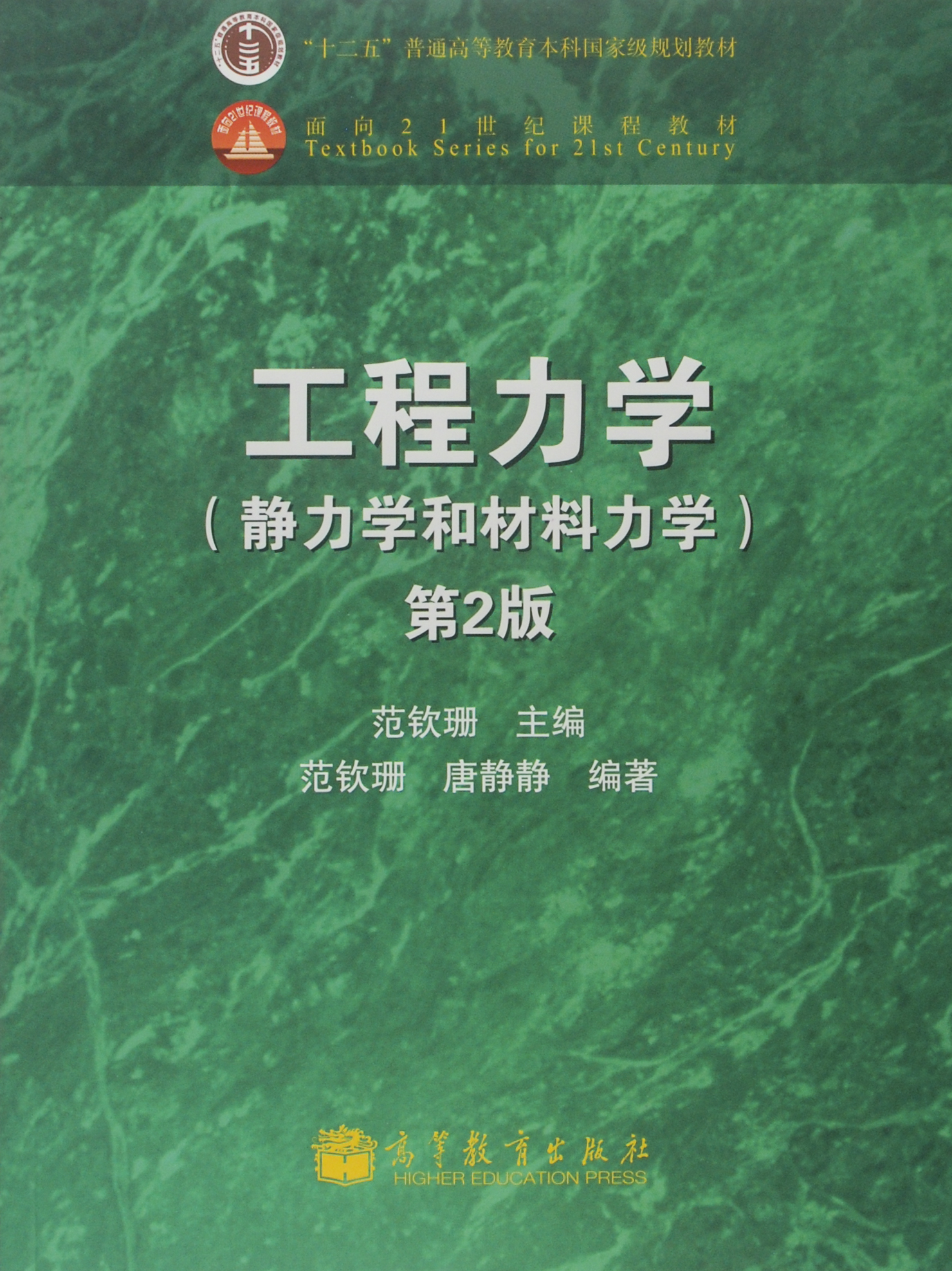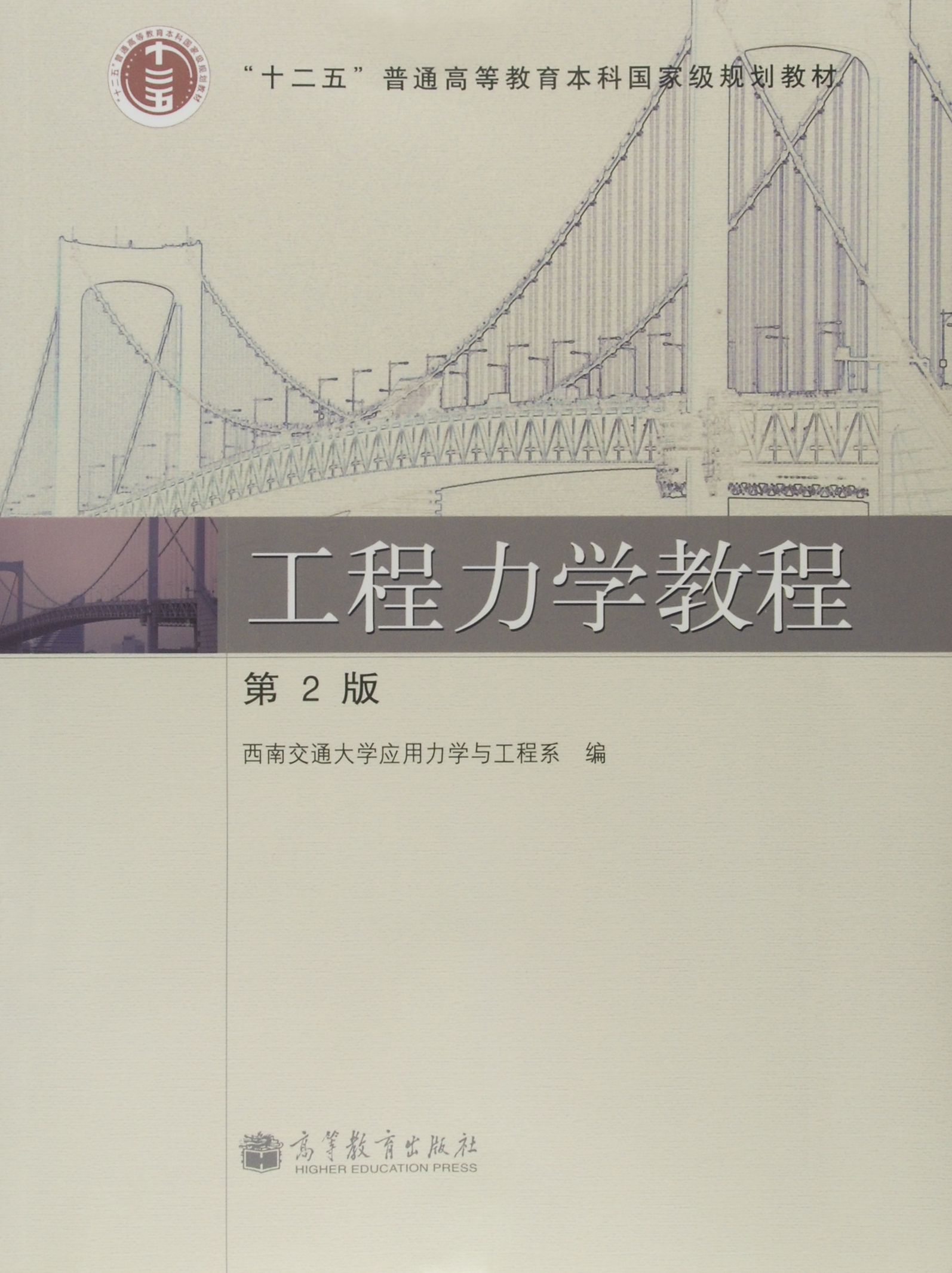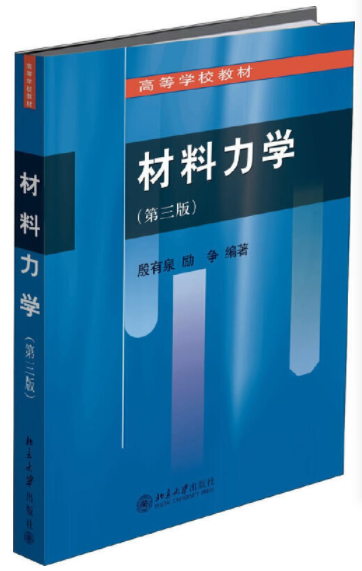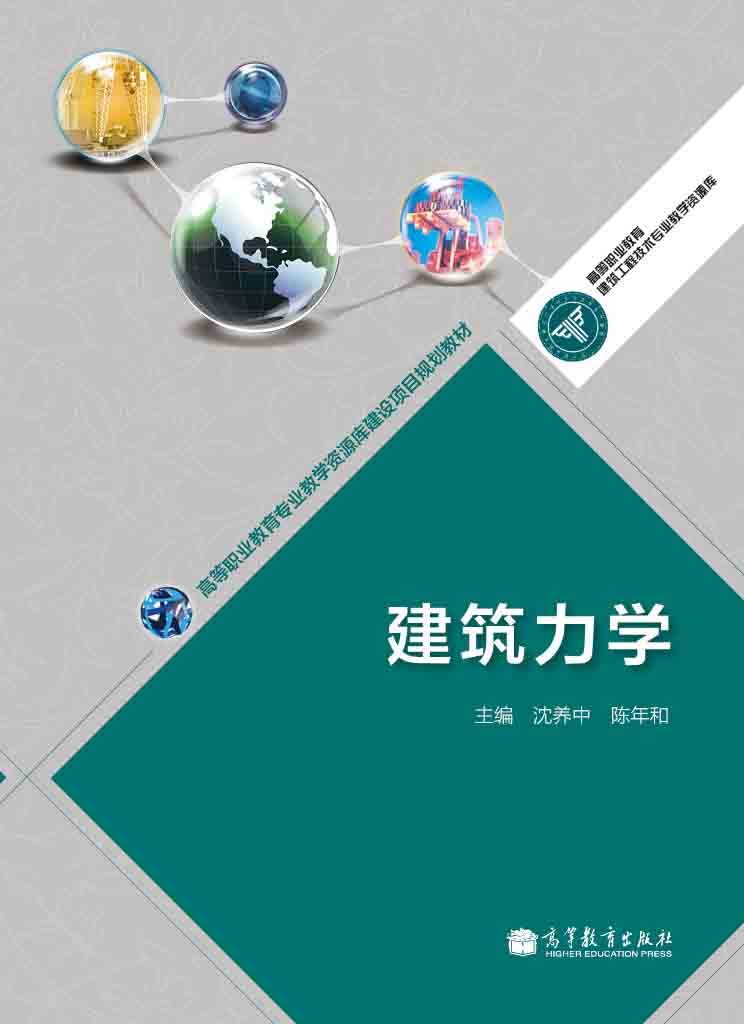材料力学(第3版)(I)
作者: 单辉祖
出版时间:2009-07-17
出版社:高等教育出版社
- 高等教育出版社
- 9787040264753
- 3
- 86335
- 0045154220-3
- 平装
- 16开
- 2009-07-17
- 490
- 419
本教材属于普通高等教育“十一五”国家级规划教材。
本教材仍保持第2版模块式的特点,由《材料力学Ⅰ》与《材料力学Ⅱ》两部分组成。《材料力学Ⅰ》包括材料力学的基本部分,涉及杆件变形的基本形式与组合形式,涵盖强度、刚度与稳定性问题。《材料力学Ⅱ》包括材料力学的加深与扩展部分。
本书为《材料力学Ⅰ》,包括绪论、轴向拉压应力与材料的力学性能、轴向拉压变形、扭转、弯曲内力、弯曲应力、弯曲变形、应力应变状态分析、强度理论、组合变形与压杆稳定问题等11章。各章均附有复习题与习题,对于部分难题,给出了求解提示或解法要点。本教材具有体系合理、论述严谨、文字精炼、层次分明、重视基础与应用、重视学生能力培养、专业面向宽与教学适用性强等特点,而且,在选材与论述上,特别注意与近代力学的发展相适应。
本书可作为高等工科学校多学时类材料力学教材,也可供大专院校、职工大学、成人高校以及工程技术人员参考。
考虑到便于教学,特为使用本教材的任课教师,配套提供《材料力学课堂讲授电子教案与习题解答》,此外,以本书为主教材的相关教学资源,还有《材料力学问题、例题与分析方法》、《材料力学学习指导书》、“材料力学网上作业系统”与“材料力学网络课程”等,以上教学资源均由高等教育出版社出版发行。
第一章 绪论
§1-1 材料力学的任务与研究对象
§1-2 材料力学的基本假设
§1-3 外力与内力
§1-4 应力
§1-5 应变
§1-6 胡克定律
§1-7 杆件变形的基本形式
复习题
习题
第二章 轴向拉压应力与材料的力学性能
§2-1 引言
§2-2 轴力与轴力图
§2-3 拉压杆的应力与圣维南原理
§2-4 材料拉伸时的力学性能
§2-5 材料拉压力学性能进一步研究
§2-6 应力集中概念
§2-7 许用应力与强度条件
§2-8 连接部分的强度计算
*§2-9 结构可靠性设计概念简介
复习题
习题
第三章 轴向拉压变形
§3-1 引言
§3-2 拉压杆的变形与叠加原理
§3-3 桁架节点位移分析与小变形概念
§3-4 拉压与剪切应变能
§3-5 简单拉压静不定问题
*§3-6 热应力与初应力
*§3-7 拉压杆弹塑性分析简介
*§3-8 结构优化设计概念简介
复习题
习题
计算机作业
第四章 扭转
§4-1 引言
§4-2 扭力偶矩计算与扭矩
§4-3 圆轴扭转横截面上的应力
§4-4 圆轴扭转破坏与强度条件
§4-5 圆轴扭转变形与刚度条件
§4-6 简单静不定轴
§4-7 非圆截面轴扭转
§4-8 薄壁杆扭转
复习题
习题
计算机作业
第五章 弯曲内力
§5-1 引言
§5-2 梁的约束与类型
§5-3 剪力与弯矩
§5-4 剪力、弯矩方程与剪力、弯矩图
§5-5 剪力、弯矩与载荷集度间的微分关系
§5-6 刚架与曲梁的内力
复习题
习题
第六章 弯曲应力
§6-1 引言
§6-2 弯曲正应力
§6-3 弯曲切应力
§6-4 梁的强度条件
§6-5 梁的合理强度设计
§6-6 双对称截面梁的非对称弯曲
复习题
习题
第七章 弯曲变形
§7-1 引言
§7-2 挠曲轴近似微分方程
§7-3 计算梁位移的积分法
*§7-4 计算梁位移的奇异函数法
§7-5 计算梁位移的叠加法
§7-6 简单静不定梁
§7-7 梁的刚度条件与合理刚度设计
复习题
习题
第八章 应力应变状态分析
§8-1 引言
§8-2 平面应力状态应力分析
§8-3 应力圆
§8-4 极值应力与主应力
§8-5 复杂应力状态的最大应力
§8-6 平面应变状态应变分析
§8-7 广义胡克定律
*§8-8 复杂应力状态下的应变能
*§8-9 复合材料应力应变关系简介
复习题
习题
第九章 强度理论
§9-1 引言
§9-2 关于断裂的强度理论
§9-3 关于屈服的强度理论
§9-4 强度理论的应用
§9-5 承压薄壁圆筒的强度计算
*§9-6 关于强度理论的试验研究
*§9-7 莫尔强度理论
复习题
习题
第十章 组合变形
§10-1 引言
§10-2 弯拉(压)组合
§10-3 偏心压缩与截面核心概念
§10-4 弯扭组合与弯拉(压)扭组合
§10-5 矩形截面杆组合变形一般情况
复习题
习题
第十一章 压杆稳定问题
§11-1 引言
§11-2 两端铰支细长压杆的临界载荷
§11-3 两端非铰支细长压杆的临界载荷
§11-4 中、小柔度杆的临界应力
§11-5 压杆稳定条件与合理设计
复习题
习题
计算机作业
附录A 截面几何性质
§A-1 静矩与形心
§A-2 极惯性矩
§A-3 惯性矩
§A-4 惯性矩平行轴定理
§A-5 惯性积与惯性积平行轴定理
§A-6 转轴公式与主惯性矩
复习题
习题
附录B 常用材料的力学性能
附录C 常见截面的几何性质
附录D 非圆截面轴扭转
附录E 梁的挠度与转角
附录F 型钢表
参考文献
习题答案
索引
Synopsis
Contents
作者简介
Chapter 1 Introduction
1-1 Objectives of Mechanics of Materials
1-2 Basic Assumptions of Mechanics of Materials
1-3 External and Internal Forces
1-4 Stress
1-5 Strain
1-6 Hook's Law
1-7 Fundamental Types of Deformation of Prismatic Bar
Problems and Exercises
Chapter 2 Stress under Axial Loading;Mechanical Properties of Materials
2-1 Introduction
2-2 Axial Force and Axial Force Diagrams
2-3 Stress in an Axially Loaded Bar;Saint-Venant's Principle
2-4 Mechanical Properties of Materials under Axial Tension
2-5 Further Study on Properties of Materials under Axial Loading
2-6 Stress Concentration
2-7 Failure,Allowable stress and Strength Criterion
2-8 Stress and Strength of Connections
*2-9 Introduction to Reliability Design of Structure
Problems and Exercises
Chapter 3 Deformation under Axial loading
3-1 Introduction
3-2 Deformations of Axially Loaded Bars;Superposition Principle
3-3 Deflection of Truss
3-4 Strain Energy for Normal and Shearing Stress
3-5 Statically Indeterminate Problems in Tension and Compression
*3-6 Thermal and Initial Stresses
*3-7 Introduction to Elastoplastic Analysis of Axially Loaded Bars
*3-8 Introduction to Structural Optimum Design
Problems and Exercises
Chapter 4 Torsion
4-1 Introduction
4-2 Twisting Couples and Torque
4-3 Torsional Stresses in a Circular Shaft
4-4 Torsional Strength of Circular Shaft;Strength Criterion of Shaft
4-5 Torsional Deformation of Circular Shaft;Stiffness Criterion of
Shaft
4-6 Statically Indeterminate Problems in Torsion
4-7 Torsion of Noncircular Shafts
4-8 Torsion of Thin-Walled Hollow Shafts
Problems and Exercises
Chapter 5 Internal Forces in Bending
5-1 Introduction
5-2 Types of Beams and Reactions
5-3 Shear Forces and Bending Moments
5-4 Shear-Force and Bending-Moment Diagrams
5-5 Relations among Shear Forces,Bending Moments and Loads
5-6 Internal Forces in Frames and Curved Beams
Problems and Exercises
Chapter 6 Bending Stresses
6-1 Introduction
6-2 Normal Stresses in Beams
6-3 Shear Stresses in Beams
6-4 Strength Criterion of Beams
6-5 Optimum Design of Beams for Strength
6-6 Unsymmetric Bending in Doubly Symmetric Beams
Problems and Exercises
Chapter 7 Deflections of Beams
7-1 Introduction
7-2 Differential Equations of the Deflection Curve
7-3 Using Integration Method to Determine the Beam Deflections
*7-4 Using Singularity Functions to Determine the Beam Deflections
7-5 Using Superposition Method to Determine the Beam Deflections
7-6 Statically Indeterminate Beams
7-7 Stiffness Criterion of Beams;Optimum Design of Beams for Stiffness
Problems and Exercises
Chapter 8 Analysis of Stress and Strain
8-1 Introduction
8-2 Analysis of Plane Stress
8-3 Mohr's Circle
8-4 Maximum and Principle Stresses in Plane Stress
8-5 Maximum Stresses in Three-Dimensional Stress
8-6 Analysis of Plane Strain
8-7 Stress-Strain Relations of Isotropic Materials
*8-8 Strain Energy for General State of Stress
*8-9 Introduction to the Stress-Strain Relations of Composite Materials
Problems and Exercises
Chapter 9 Theories of Failure
9-1 Introduction
9-2 Maximum Tensile Stress Theory;Maximum Tensile Strain Theory
9-3 Maximum Shearing Stress Theory;Distortion Energy Theory
9-4 The Applications of Failure Theories
9-5 Thin-Walled Pressure Circular Cylinders
*9-6 Experimental Verification of Failure Theories
*9-7 Mohr Theory of Failure
Problems and Exercises
Chapter 10 Combined loading
10-1 Introduction
10-2 Combined Bending and Axial Load
10-3 Eccentrical Loading;Core of Sections
10-4 Combined Bending and Torsion;Combined Bending,Torsion and Axial Load
10-5 General Cases of Combined Loading for Bars with Rectangular Cross-section
Problems and Exercises
Chapter 11 Buckling of Columns
11-1 Introduction
11-2 Critical Load for Pin-Ended Columns
11-3 Critical Load for Non-Pin-Ended Columns
11-4 Critical Stresses for Intermediate and Short Columns
11-5 Stability Cretirion and Optimum Design of Columns
Problems and Exercises
Appendix A Geommetrical Propreties of Plane Areas
A-1 Static Moment and Centroid of Area
A-2 Polar Moment of Inertia
A-3 Moments of Inertia
A-4 Parallel Axis Theorem for Moments of Inertia
A-5 Product of Inertia;Parallel Axis Theorem for Product of Inertia
A-6 Transformation Equations and Principle Moment of Inertia
Problems and Exercises
Appendix B Mechanical Properties of Selected Engineering Materials
Appendix C Geometrical Properties of Plane Areas
Appendix D Torsion of Noncircular Shafts
Appendix E Deflections and Slopes of Beams
Appendix F Properties of Rolled-Steel Shapes
References
Answers
Index
Synopsis
Contents
A Brief Introduction to the Author










